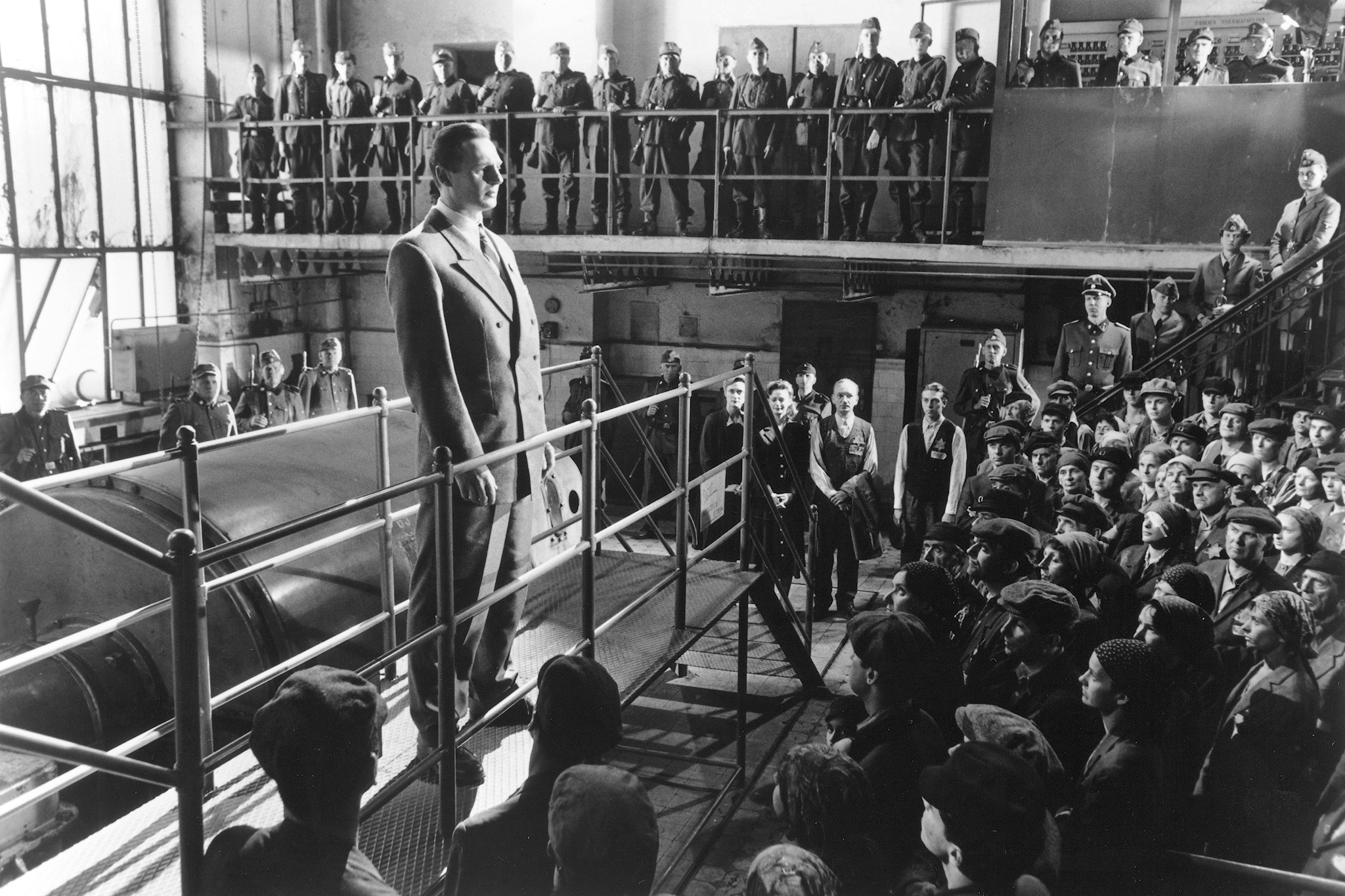It is a shame that such a masterpiece of a film is filled with such distortions, especially of such genuinely decent people that actually did the most to save Jews. Instead, the film honors a criminal that actually was involved in war crimes prior to "helping" Jews, but does this absolve him of crimes against the Polish at the start of the war. In my conversations, it seems so.
The scenes in the film featuring Gentile Poles portray them as anti-Semitic German collaborators. Also, the film's depiction of the 1939 September campaign in Poland features incorrect information.
Starting with the film's beginning, Schindler's List depicts the Poles as not resisting the German occupation and as Nazi accommodators and fanatical anti-Semites. In one of the film's early scenes, an on-screen note informs the viewer that the German army defeated Poland in a mere two weeks. In a scene that takes place in September 1939, SS officers attend a lavish banquet. Their jovial Polish girlfriends accompany them.
At another Nazi officer party, a Polish orchestra plays for them a famous Polish tango written by Mieczysław Fogg, which leaves no doubts regarding the orchestra's nationality. Ironically, the tangos composer Fogg hid Jews in his Warsaw apartment under Nazi occupation. Years later, he was named one of the "Righteous Among the Nations" by Yad Vashem in Israel.
Even though that number is minuscule in comparison to the number of Poles that actually saved the lives of Jews, it is estimated that up to 3 million Poles in some way aided Jews. Without the help of Poles in feeding the Warsaw Ghetto, the Jews would have starved to death within two months, but facts like this are hardly known and are lost on directors like Spielberg.
Later, after the swift September campaign, the Poles are again shown in an unflattering light. In the scene when the Jews are herded into the ghetto, their Polish neighbors are shown standing unmolested on the sidelines, throwing mud at the Jews. In one of Schindler's List's more disturbing moments, a small girl repeatedly screams in a high-pitched, angry voice, "Goodbye, Jews!" As Andrew Nagorski writes: "[T]he chilling scene of a young girl screaming with hatred, 'Good-bye Jews!' as victims were herded into the ghetto, seem[s] to suggest that the only role Poles played was to applaud German terror." Ironically, Poles could play no part in this. They were not allowed to witness this, and it was the Jewish police that perpetrated these crimes.
As the film progresses, the Poles collaborate with the Third Reich in the Final Solution. In the scenes that take place in the Plaszow concentration camp, the guards and doctors are Poles. In one scene, when the Jews are forced to run naked, camp guards yell commands in Polish. In another scene, the camp administration selects Jewish women for labor. Doctors examine them and ask them to stand and open their mouths again in Polish. Finally, when Jewish women are sent to the camp showers where they are gassed and killed, women command them in Polish to disrobe, take soap, and shower.
Finally, Spielberg ends his film with a note saying that the Jews Schindler saved and their descendant's number 6,000, while Poland's present Jewish population is less than 4,000. This implies much about what Spielberg believes regarding Polish-Jewish relations. Many film viewers have interpreted this to signify that the Poles were thoroughly indifferent to the Shoah. Even film critic Roger Ebert subscribed to this view. "The obvious lesson would seem to be that Schindler did more than a whole nation to spare its Jews," he writes.
Perhaps most important is the fact that Poland had no official collaborators.
However, the Polish underground was the largest and most sophisticated in German-occupied Europe, while no collaborationist governments were formed in Poland.
Were the Poles so unwilling to help their Jewish neighbors? One of the fascinating things about Polish aid to Jews during the German occupation is that many anti-Semites rescued Jews. For example, Zofia Kossak, a writer who co-founded Zegota, the only underground council to help Jews in occupied Europe, was famous for her nationalism and anti-Semitism. Yet she believed that as Catholic victims of German oppression, the Poles had a religious and patriotic duty to help Jews. Meanwhile, Rev. Marceli Godlewski, the vicar of the All Saints Church, the only parish within the Warsaw Ghetto, was known for his anti-Semitic sermons. Yet after witnessing Nazi brutality, he hid Jews in his church. He gave escaping Jews the birth certificates of deceased parishioners and smuggled Jewish children out of the ghetto under his cassock.
But there were also some logical reasons for dislike for Jews because many Jews also didn't like Poles and would collaborate with whoever occupied Poland; for the Polish, they saw this as treason. The Jews welcomed the Soviets in the east on September 17, 1939, and even the Germans in some parts of Poland. The Jews in the Ghettos had their own organized collaborationist government, the Judenrat, and even their own Ghetto police that were the ones that sent their own to the camps, not the Poles.
Of all countries, Poland has the most "Righteous among the Nations" recognized by Yad Vashem. Though estimates vary, one standard measure is that Poles rescued approximately 45,000 Jews from certain death. Because Poland's pre-war Jewry exceeded 3.5 million, this may seem disappointing. However, this must be properly contextualized.
The Poles were in a more difficult situation than the people of France, Denmark, and Holland, where locals formed collaborationist governments with the Nazi occupiers and Jews were numerically few well assimilated into Gentile society. More important, however, unlike the Poles, the Danes, French, or Dutch did not face immediate execution of themselves and their families and neighbors. Because of the harsh punishment Poles faced for helping Jews, hundreds of thousands of Polish Christians unsuccessfully tried to aid Jews.
In conclusion, from an artistic point of view, Schindler's List is unquestionably one of the great American films of the 1990s. However, to any student of Polish-Jewish relations, Spielberg's depiction of encounters between Poles and Jews in German-occupied Krakow is simplistic, and it is Holocaust revisionism.
Instead of making a movie about the country and the people that did the most to save the Jews, he makes a film about one of the few within the country that was out to eliminate them.
With sources form:
Filip Mazurczak



Dodaj
komentarz
By dodać komentarz musisz być zalogowany. Zaloguj się.
Nie masz jeszcze konta? Zarejestruj się.